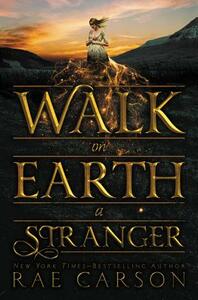You need to sign in or sign up before continuing.
Take a photo of a barcode or cover
When I started this book I loved the premise and I was so excited to keep reading. The beginning is fast-paced and shocking and I loved the girl-dressed-as-boy plot. But as the book went on I became severely bored. Most of the book is spent traveling west to California and it took forever to get through. There were some crazy things that happened on the journey yet I still found myself dying for it to be over. It took the characters a few months to make the trip and I honestly felt like I was reading for months. I also thought the gold sensing plot was randomly put on the back burner for no reason? There were long spans of the book where it wasn't even an important plot point. I think this is meant to be a trilogy and I honestly can't even bare the thought of reading a sequel to this if it is going to have a similar pace. I'm giving this 3-stars because the writing style was quite good and I appreciated the historical accuracy.
medium-paced
adventurous
emotional
hopeful
informative
inspiring
reflective
tense
fast-paced
Plot or Character Driven:
A mix
Strong character development:
Yes
Loveable characters:
Yes
Diverse cast of characters:
Yes
Flaws of characters a main focus:
Complicated
Remember the Oregon trail game? Lots of dying. Really good book and characters and development.
adventurous
challenging
sad
tense
medium-paced
Plot or Character Driven:
A mix
Strong character development:
No
Loveable characters:
Yes
Diverse cast of characters:
Yes
Flaws of characters a main focus:
Yes
Another great option for a summer read! Our main character finds herself parentless and homeless and decides to make her way, with so many others, out to California to strike it rich. Disguising herself as a boy, she learns just how perilous and troublesome the road can be, even for a boy. The supporting characters are both great and terrible, and the reader gets an informational history lesson about the period's politics.
Wow.
Walk on Earth a Stranger was nothing like I thought it was going to be. I went in expecting something more high fantasy inspired (because of Leah's gold-sensing abilities) with more action. But I got something so much better than I could have ever anticipated.
Walk on Earth a Stranger is about the Oregon trail. That's it, basically. Leah Westfall's parents are murder and she runs away from her uncle by joining a group going to California for the gold rush. Along the way there's disagreements, disease, death, secrets, love, pain-- the whole human experience, basically.
Maybe part of the reason I loved it so much was nostalgia. When I was in 4th grade we learned about the Oregon trail (well... as much as they were willing to tell 4th graders. I know it was super sugar coated) and of course there was the Oregon trail game, too. And the Little House on the Prairie books. And this book brought those memories right back. It was clear to me that Rae Carson did a lot of research to make this journey feel authentic, and it did.
It also felt authentic because she didn't sugar coat things. People died, just like they did on the real Oregon trail. There were characters that were racist, both against Native Americans and black people (side note: Rae chose to use the terms of the time period when referring to both of these groups, which also helped the book feel authentic). Leah, despite being strong and capable and smart, faced sexism once it was revealed that she was a girl (more on that in a bit). It's tempting to write a historical story filled with characters that have contemporary values, but it feels more true this way.
Now about Leah pretending to be a boy. I'm not usually a fan of this trope, because it often creates drama that feels unnecessary. But here, it was completely necessary. I once took an English class in which we talked about character mobility and how in previous centuries it was difficult to write a variety of stories about women because it wasn't feasible to the audience that a female character would have the kind of mobility necessary to do a lot of the things a male character could do. And that's true here. Leah, a girl on her own, could not have found a group to travel with in 1849. It wouldn't have mattered how capable she was, nobody would have taken her. Once she's revealed to be a girl, this sexism shows itself. Even though her traveling companions already know that she's capable of hunting and doing so-called "man's work," they are hesitant to let her keep doing what she was doing before. It's important not to glaze over this.
Also, I find it important that her period wasn't glazed over. I always wonder, while reading books and watching movies about girls pretending to be boys, how they're going to deal with that. It all comes back to the authenticity thing.
I'm not exactly sure how this is going to be a trilogy, but I am so glad there's going to be more. In fact, I might go and buy Rae Carson's Girl of Fire and Thorns trilogy while I'm waiting for the next book because I really really really want more. I highly recommend Walk on Earth a Stranger, it was interesting, exciting, heartfelt; everything I didn't know I wanted it to be.
Walk on Earth a Stranger was nothing like I thought it was going to be. I went in expecting something more high fantasy inspired (because of Leah's gold-sensing abilities) with more action. But I got something so much better than I could have ever anticipated.
Walk on Earth a Stranger is about the Oregon trail. That's it, basically. Leah Westfall's parents are murder and she runs away from her uncle by joining a group going to California for the gold rush. Along the way there's disagreements, disease, death, secrets, love, pain-- the whole human experience, basically.
Maybe part of the reason I loved it so much was nostalgia. When I was in 4th grade we learned about the Oregon trail (well... as much as they were willing to tell 4th graders. I know it was super sugar coated) and of course there was the Oregon trail game, too. And the Little House on the Prairie books. And this book brought those memories right back. It was clear to me that Rae Carson did a lot of research to make this journey feel authentic, and it did.
It also felt authentic because she didn't sugar coat things. People died, just like they did on the real Oregon trail. There were characters that were racist, both against Native Americans and black people (side note: Rae chose to use the terms of the time period when referring to both of these groups, which also helped the book feel authentic). Leah, despite being strong and capable and smart, faced sexism once it was revealed that she was a girl (more on that in a bit). It's tempting to write a historical story filled with characters that have contemporary values, but it feels more true this way.
Now about Leah pretending to be a boy. I'm not usually a fan of this trope, because it often creates drama that feels unnecessary. But here, it was completely necessary. I once took an English class in which we talked about character mobility and how in previous centuries it was difficult to write a variety of stories about women because it wasn't feasible to the audience that a female character would have the kind of mobility necessary to do a lot of the things a male character could do. And that's true here. Leah, a girl on her own, could not have found a group to travel with in 1849. It wouldn't have mattered how capable she was, nobody would have taken her. Once she's revealed to be a girl, this sexism shows itself. Even though her traveling companions already know that she's capable of hunting and doing so-called "man's work," they are hesitant to let her keep doing what she was doing before. It's important not to glaze over this.
Also, I find it important that her period wasn't glazed over. I always wonder, while reading books and watching movies about girls pretending to be boys, how they're going to deal with that. It all comes back to the authenticity thing.
I'm not exactly sure how this is going to be a trilogy, but I am so glad there's going to be more. In fact, I might go and buy Rae Carson's Girl of Fire and Thorns trilogy while I'm waiting for the next book because I really really really want more. I highly recommend Walk on Earth a Stranger, it was interesting, exciting, heartfelt; everything I didn't know I wanted it to be.
adventurous
emotional
slow-paced
Lovely book. Slow in parts but a great heroine who evolved the entire way. Looking forward to the next installment in this series.
It was a nice change of pace to read a historical western, non fantasy book.
It was a nice change of pace to read a historical western, non fantasy book.
More reviews available at my blog, Beauty and the Bookworm.
Let me begin by saying this: if you're coming to Walk On Earth a Stranger hot off Carson's other series, Girl of Fire and Thorns, and you're hoping for another sweeping fantasy-romance, you've come to the wrong place. Walk on Earth is a wonderful book in its own right, and I'll go into that in more detail, but it is not Girl of Fire and Thorns, Crown of Embers, or The Bitter Kingdom. Carson really showed her fantasy talent in that series, and I admit it: I was hoping for more of the same, but in a more realistic environment, after reading the description of the book. It talks about Leah, a girl with the magical ability to sense gold wherever it may be found, who is forced to leave home and head west disguised as a boy to escape a tragedy at home. Based on that, and on Carson's previous works, I expected a significant fantasy thread to be wound through the story. It wasn't. Leah's ability is important to getting the plot going, but plays a very minimal role from then on, and the role it does play is more for "seasoning" than for actual plot advancement--which seems a bit silly, considering that it's supposed to be one of her integral characteristics.
No, what makes this book shine (like gold!) is not the fantasy element it totes in the description. Instead, it's Caron's use of another strong heroine and her decision to place Leah in a rather underutilized time and place. Carson sets Leah's story at the beginning of the California Gold Rush in 1849 and 1850, beginning in Georgia in a town that''s dying after a former gold rush and winding across the continent to the edge of California. This is a time and journey that I haven't seen at all in young adult fiction. It might be present in an American Girl book or two, but in mainstream young adult fiction, the kind that's been so popular in recent years? No. Not at all. Historical fiction as a whole isn't very strong in young adult right now, in comparison to the surges of paranormal, contemporary romance, fairytale adaptations, and traditional fantasy that have swamped shelves lately, which makes seeing a book like this--with a light fantasy touch but a strong historical fiction background and plot--is really neat.
This book's particular setting also resonated with me (and probably a large chunk of the readership) because of a very specific demographic: kids who played Oregon Trail, whether it be in school or out. There were pretty much a million iterations of Oregon Trail, including a knockoff which was quite popular on Facebook a few years ago. Reading about Leah's journey across the United States, particularly after she hooks up with the wagon train, is completely reminiscent of Oregon Trail. Cholera, bison hunts, the peril of running low on supplies or the absolute tragedy of facing a broken axle: it all brings back those strings of tragedies on the screen, leaving behind graves and knowing that your party was, in fact, not going to make it to Oregon. Leah and her party are bound for California, not Oregon, but the journey is the same for much of the trip and the troubles definitely parallel each other.
Partnered with those perils are the very real issues of the time, some of which carry on into modern society, and Carson handles them with a deft hand. Racism against African Americans and Native Americans (referred to with the polite period vocabulary of "Negroes" and "Indians," which I applaud because I don't think words should be censored from historical or historical-based works, they just have to be dealt with properly) shows up in various forms and with various attitudes toward it; tiny acts of kindness, like the offer of a blanket to someone in need, or acts of cruelty, like scorning someone who's been so helpful and reliable to you, can add up and make or break someone. Sometimes we have to leave behind the things we would rather take with us if we want to survive--sometimes those "things" are people. And sometimes we have to realize that there might not be much good waiting for us at the journey's end, but we have to keep going anyway. Carson wraps all of these things into the story and into Leah's character, and I think it makes the reality of her situation real, and her character more believable. She's not perfect; she lies, she keeps secrets, she gets jealous and petty and can be wasteful, but she's still a good person at heart, and that shines through everything else. No matter what the hardships she faces, I couldn't help but root for her.
One big thing about this book: it's basically a big road trip, and the end goal is just a vague notion. Leah wants to reach California to escape her uncle (even though she knows he's headed that way, too, which doesn't make a ton of sense) because she can really put her gold sense to use there. But by the end of the book, Leah and her party members have just reached California, and there isn't really any time for events there to unfold. The majority of the book is the journey and the difficulties along the way, which serve to allow Leah to build up a network of people to draw on once California has been reached. It means it's a very character-driven book, which might not rub along well with some young adult readers. Most young adult books tend to be more plot driven, even when the plot is dragging the characters along kicking and screaming, and this book is definitely not like this which may come as an unpleasant surprise to some. It definitely reads as set-up for the next book, which I think has the potential to have a heavier reliance on Leah's abilities and a more central and driving plot. That said, I think this was a stunning, unique example of young adult fiction, and I can see why people have lauded it so much. I definitely recommend this to anyone looking for something different in YA, as long as you're willing to take all the different as it comes.
4 stars out of 5.
Let me begin by saying this: if you're coming to Walk On Earth a Stranger hot off Carson's other series, Girl of Fire and Thorns, and you're hoping for another sweeping fantasy-romance, you've come to the wrong place. Walk on Earth is a wonderful book in its own right, and I'll go into that in more detail, but it is not Girl of Fire and Thorns, Crown of Embers, or The Bitter Kingdom. Carson really showed her fantasy talent in that series, and I admit it: I was hoping for more of the same, but in a more realistic environment, after reading the description of the book. It talks about Leah, a girl with the magical ability to sense gold wherever it may be found, who is forced to leave home and head west disguised as a boy to escape a tragedy at home. Based on that, and on Carson's previous works, I expected a significant fantasy thread to be wound through the story. It wasn't. Leah's ability is important to getting the plot going, but plays a very minimal role from then on, and the role it does play is more for "seasoning" than for actual plot advancement--which seems a bit silly, considering that it's supposed to be one of her integral characteristics.
No, what makes this book shine (like gold!) is not the fantasy element it totes in the description. Instead, it's Caron's use of another strong heroine and her decision to place Leah in a rather underutilized time and place. Carson sets Leah's story at the beginning of the California Gold Rush in 1849 and 1850, beginning in Georgia in a town that''s dying after a former gold rush and winding across the continent to the edge of California. This is a time and journey that I haven't seen at all in young adult fiction. It might be present in an American Girl book or two, but in mainstream young adult fiction, the kind that's been so popular in recent years? No. Not at all. Historical fiction as a whole isn't very strong in young adult right now, in comparison to the surges of paranormal, contemporary romance, fairytale adaptations, and traditional fantasy that have swamped shelves lately, which makes seeing a book like this--with a light fantasy touch but a strong historical fiction background and plot--is really neat.
This book's particular setting also resonated with me (and probably a large chunk of the readership) because of a very specific demographic: kids who played Oregon Trail, whether it be in school or out. There were pretty much a million iterations of Oregon Trail, including a knockoff which was quite popular on Facebook a few years ago. Reading about Leah's journey across the United States, particularly after she hooks up with the wagon train, is completely reminiscent of Oregon Trail. Cholera, bison hunts, the peril of running low on supplies or the absolute tragedy of facing a broken axle: it all brings back those strings of tragedies on the screen, leaving behind graves and knowing that your party was, in fact, not going to make it to Oregon. Leah and her party are bound for California, not Oregon, but the journey is the same for much of the trip and the troubles definitely parallel each other.
Partnered with those perils are the very real issues of the time, some of which carry on into modern society, and Carson handles them with a deft hand. Racism against African Americans and Native Americans (referred to with the polite period vocabulary of "Negroes" and "Indians," which I applaud because I don't think words should be censored from historical or historical-based works, they just have to be dealt with properly) shows up in various forms and with various attitudes toward it; tiny acts of kindness, like the offer of a blanket to someone in need, or acts of cruelty, like scorning someone who's been so helpful and reliable to you, can add up and make or break someone. Sometimes we have to leave behind the things we would rather take with us if we want to survive--sometimes those "things" are people. And sometimes we have to realize that there might not be much good waiting for us at the journey's end, but we have to keep going anyway. Carson wraps all of these things into the story and into Leah's character, and I think it makes the reality of her situation real, and her character more believable. She's not perfect; she lies, she keeps secrets, she gets jealous and petty and can be wasteful, but she's still a good person at heart, and that shines through everything else. No matter what the hardships she faces, I couldn't help but root for her.
One big thing about this book: it's basically a big road trip, and the end goal is just a vague notion. Leah wants to reach California to escape her uncle (even though she knows he's headed that way, too, which doesn't make a ton of sense) because she can really put her gold sense to use there. But by the end of the book, Leah and her party members have just reached California, and there isn't really any time for events there to unfold. The majority of the book is the journey and the difficulties along the way, which serve to allow Leah to build up a network of people to draw on once California has been reached. It means it's a very character-driven book, which might not rub along well with some young adult readers. Most young adult books tend to be more plot driven, even when the plot is dragging the characters along kicking and screaming, and this book is definitely not like this which may come as an unpleasant surprise to some. It definitely reads as set-up for the next book, which I think has the potential to have a heavier reliance on Leah's abilities and a more central and driving plot. That said, I think this was a stunning, unique example of young adult fiction, and I can see why people have lauded it so much. I definitely recommend this to anyone looking for something different in YA, as long as you're willing to take all the different as it comes.
4 stars out of 5.




